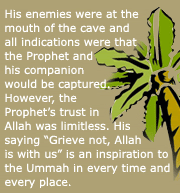dont get angry
Abû Hurayrah relates that a man said to the Prophet (peace be upon him): “Counsel me.” The Prophet (peace be upon him) said: “Do not get angry.” The man repeated his request many times, but the Prophet (peace be upon him) kept saying: “Do not get angry.”
The importance of this hadith: The secret behind this had#299;tahu's importance lies in the fact that the Prophet (peace be upon him) limited his counsel to this person in one short instruction: “Do not get angry.” Al-Nawawî informs us that Abû Muhammad `Abd Allah b. Abî Zayd said: “Everything that constitutes good manners can be derived from four hadith…” and mentioned among them the Prophet's statement “…to the one to whom he limited his counsel with: ‘Do not get angry'.”
This statement, given in this context, is rich in meaning. First, by limiting his counsel to this one short instruction, the Prophet (peace be upon us) indicates the importance of controlling one's anger, and that doing so has far-reaching implications for a person's welfare both in the worldly life and in the Hereafter. Ibn Hajar, in his commentary on this hadith, observes:The man stated his question repeatedly, hoping to solicit an answer that was more beneficial, or more explanatory, or more general; however he did not give him anything more than that.”
Anger is a very powerful emotion. It rages through a person, creating a desire for revenge and for striking out at the object of anger. Anger is an emotion that inspires action, and the action that it inspires is one of injury. The emotion of anger invokes within a person the very antithesis of mercy, compassion, self-restraint, and kindness. This is what makes the emotion so dangerous. If left unchecked and uncontrolled, it is the emotion that can lead a person to the evilest of deeds and to the worst and most tragic consequences. Sabeelillaah: where we're dedicated in spreading the Islaam that the Sahaabah, Taabi'oon and Salaf-us-Saalih were upon.
The importance of this hadith: The secret behind this had#299;tahu's importance lies in the fact that the Prophet (peace be upon him) limited his counsel to this person in one short instruction: “Do not get angry.” Al-Nawawî informs us that Abû Muhammad `Abd Allah b. Abî Zayd said: “Everything that constitutes good manners can be derived from four hadith…” and mentioned among them the Prophet's statement “…to the one to whom he limited his counsel with: ‘Do not get angry'.”
This statement, given in this context, is rich in meaning. First, by limiting his counsel to this one short instruction, the Prophet (peace be upon us) indicates the importance of controlling one's anger, and that doing so has far-reaching implications for a person's welfare both in the worldly life and in the Hereafter. Ibn Hajar, in his commentary on this hadith, observes:The man stated his question repeatedly, hoping to solicit an answer that was more beneficial, or more explanatory, or more general; however he did not give him anything more than that.”
Anger is a very powerful emotion. It rages through a person, creating a desire for revenge and for striking out at the object of anger. Anger is an emotion that inspires action, and the action that it inspires is one of injury. The emotion of anger invokes within a person the very antithesis of mercy, compassion, self-restraint, and kindness. This is what makes the emotion so dangerous. If left unchecked and uncontrolled, it is the emotion that can lead a person to the evilest of deeds and to the worst and most tragic consequences. Sabeelillaah: where we're dedicated in spreading the Islaam that the Sahaabah, Taabi'oon and Salaf-us-Saalih were upon.









0 Your Thoughts:
Post a Comment
<< Home